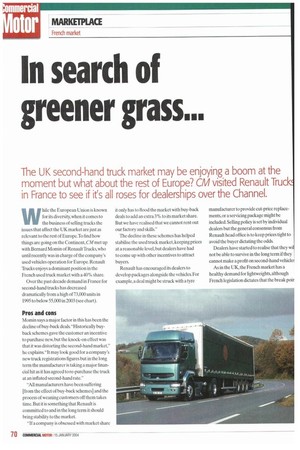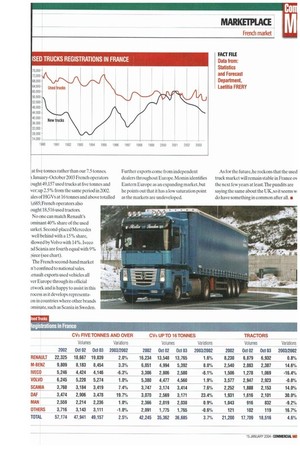In search of
Page 74

Page 75

If you've noticed an error in this article please click here to report it so we can fix it.
greener grass...
The UK second-hand truck market may be enjoying a boom at the moment but what about the rest of Europe? CM visited Renault Truck9 in France to see if it's all roses for dealerships over the Channel.
Wbile the European Union is known for its diversity, when it comes to the business of selling trucks the issues that affect the UK market are just as relevant to the rest of Europe.To find how things are going on the Continent, CM met up with Bernard Momin of Renault Trucks, who until recently was in charge of the company's used vehicles operation for Europe. Renault Trucks enjoys a dominant position in the French used truck market with a 40% share.
Over the past decade demand in France for second-hand trucks has decreased dramatically from a high of 73,000 units in 1995 to below 55,000 in 2003 (see chart).
Pros and cons Momin says a major factor in this has been the decline of buy-back deals. "Historically buyback schemes gave the customer an incentive to purchase new, but the knock-on effect was that it was distorting the second-hand market," he explains. "It may look good for a company's new truck registrations figures but in the long term the manufacturer is taking a major financial hit as it has agreed to re-purchase the truck at an inflated second-hand rate."
"All manufacturers have been suffering [from the effect of buy-back schemes] and the process of weaning customers off them takes time. But it is something that Renault is committed to and in the long term it should bring stability to the market.
"If a company is obsessed with market share it only has to flood the market with buy-back deals to add an extra 3% to its market share. But we have realised that we cannot rent out our factory and skills."
The decline in these schemes has helped stabilise the used truck market, keeping prices at a reasonable level, but dealers have had to come up with other incentives to attract buyers.
Renault has encouraged its dealers to develop packages alongside the vehicles. For example, a deal might be struck with a tyre manufacturer to provide cut-price replacements, or a servicing package might be included. Selling policy is set by individual dealers but the general consensus from Renault head office is to keep prices tight to avoid the buyer dictating the odds.
Dealers have started to realise that they wi not be able to survive in the long term if they cannot make a profit on second-hand vehicle As in the UK, the French market has a healthy demand for lightweights, although French legislation dictates that the break poir at five tonnes rather than our 7.5 tonnes. January-October 2003 French operators ught 49,157 used trucks at five tonnes and ver: up 2.5% from the same period in 2002. ales of HGVs at 16 tonnes and above totalled 5,685; French operators also ought 18,516 used tractors.
No one can match Renault's ominant 40% share of the used iarket. Second-placed Mercedes well behind with a 15% share, illowed by Volvo with 14%. Iveco ad Scania are fourth equal with 9% piece (see chart).
The French second-hand market II n't confined to national sales. .enault exports used vehicles all ver Europe through its official etwork and is happy to assist in this rocess as it develops representaon in countries where other brands ominate, such as Scania in Sweden. Further exports come from independent dealers throughout Europe. Momin identifies Eastern Europe as an expanding rnarket, hut he points out that it has a low saturation point as the markets are undeveloped. As for the future, he reckons that the used truck market will remain stable in France ov the next few years at least.The pundits are saying the same about the UK, so it seems w do have something in common after all. •
































































































































































































